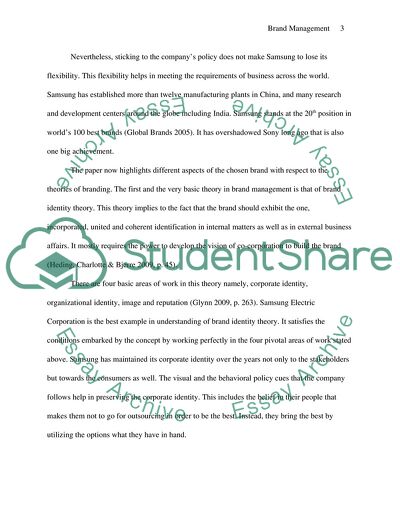
- Home
- Free Samples
- Premium Essays
- Editing Services
- Extra Tools
- Essay Writing Help
- About Us
- Studentshare
- Subjects
- Miscellaneous
- Brand Management
Brand Management - Essay Example

- Subject: Miscellaneous
- Type: Essay
- Level: Ph.D.
- Pages: 4 (1000 words)
- Downloads: 0
- Author: wilmer95
Extract of sample "Brand Management"
In 1969, Samsung, a South Korean Company, started its business in the market having tough competitors as producers of low-priced black and white televisions. It then emerged as the prime manufacturer of TV, VCRs, ovens etc. in the international market. Since then, Samsung holds a firm grip on world’s electronic appliances trade. The recent developments in the company include the production of IC fabricated chips to catch up with the modern electronic equipments. The advent of Samsung mobile phone has given the company a new off shoot to its development.
Samsung outstand the companies that opt to outsource their production and manufacturing process in order to get their services done from an outside country. Samsung Electric Company sticks to its policy, commits to its most valuable forte, and its core competence i.e. Production and Manufacturing. The core policy to sub production group is to maintain the competition with the other contemporary companies for the matters of internal business. Nevertheless, sticking to the company’s policy does not make Samsung to lose its flexibility.
This flexibility helps in meeting the requirements of business across the world. Samsung has established more than twelve manufacturing plants in China, and many research and development centers around the globe including India. Samsung stands at the 20th position in world’s 100 best brands (Global Brands 2005). It has overshadowed Sony long ago that is also one big achievement. The paper now highlights different aspects of the chosen brand with respect to the theories of branding. The first and the very basic theory in brand management is that of brand identity theory.
This theory implies to the fact that the brand should exhibit the one, incorporated, united and coherent identification in internal matters as well as in external business affairs. It mostly requires the power to develop the vision of
...Download file to see next pages Read MoreCHECK THESE SAMPLES OF Brand Management
Chrysler Brand Management
Contemporary Brand Management
BRAND MANAGEMENT & RESEARCH
Brand Management for Rolex
Brand Management for Rolex
Aspects of Brand Management
Analysis of Brand Management
Strategic Brand Management

- TERMS & CONDITIONS
- PRIVACY POLICY
- COOKIES POLICY